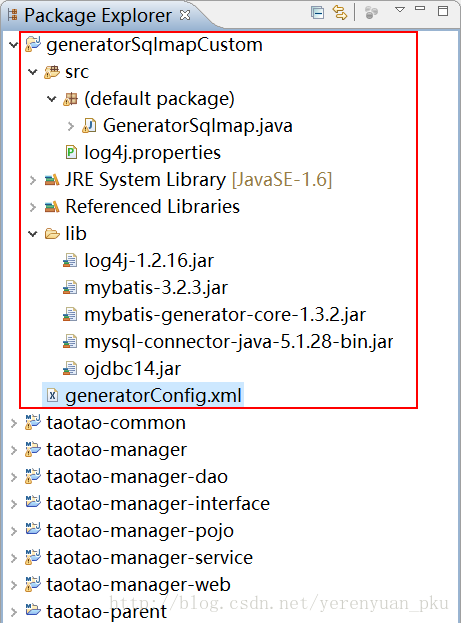http://blog.csdn.net/yerenyuan_pku/article/details/72758590
我们知道在开发中有些工作是非常耗时但是又没有什么技术含量的,比如创建mapper文件、pojo、dao等,我们更关心的是业务逻辑的处理,而不是这些无关紧要的东西,因此如果能有工具帮我们自动生成代码将是非常棒的一件事情,这些mybatis官方已经为我们考虑到了,mybatis官方提供了逆向生成代码工程,我们只需要修改下配置文件便可以非常方便的生成接口、pojo、dao。如果有同学对mybatis的逆向生成代码工程不熟悉,可参考我的文章——MyBatis框架的学习(七)——MyBatis逆向工程自动生成代码,这篇文章我就已经讲的很详细了,但我在此再讲一遍,希望读者能多多留心。
下面是我所使用的mybatis官方提供的逆向生成代码工程。 
接着我们把该工程导入到我们的workspace目录下,该过程省略,相信大家都知道。import完成之后,我们可以看到逆向工程的整个目录结构如下图所示。 
接下来,我们修改generatorConfig.xml配置文件来帮我们自动生成代码。 打开generatorConfig.xml配置文件,文件内容如下。配置文件中的注释已经解释的很清楚了,我就不啰嗦了。注意,我们一定要根据自己数据库的用户名和密码进行配置。
<?xml version="1.0" encoding="UTF-8"?>
<!DOCTYPE generatorConfiguration
PUBLIC "-//mybatis.org//DTD MyBatis Generator Configuration 1.0//EN"
"http://mybatis.org/dtd/mybatis-generator-config_1_0.dtd">
<generatorConfiguration>
<context id="testTables" targetRuntime="MyBatis3">
<commentGenerator>
<!-- 是否去除自动生成的注释 true:是 : false:否 -->
<property name="suppressAllComments" value="true" />
</commentGenerator>
<!--数据库连接的信息:驱动类、连接地址、用户名、密码 -->
<jdbcConnection driverClass="com.mysql.jdbc.Driver"
connectionURL="jdbc:mysql://localhost:3306/taotao" userId="root"
password="yezi">
</jdbcConnection>
<!-- 默认false,把JDBC DECIMAL 和 NUMERIC 类型解析为 Integer,为 true时把JDBC DECIMAL 和
NUMERIC 类型解析为java.math.BigDecimal -->
<javaTypeResolver>
<property name="forceBigDecimals" value="false" />
</javaTypeResolver>
<!-- targetProject:生成PO类的位置 -->
<javaModelGenerator targetPackage="com.taotao.pojo"
targetProject=".src">
<!-- enableSubPackages:是否让schema作为包的后缀 -->
<property name="enableSubPackages" value="false" />
<!-- 从数据库返回的值被清理前后的空格 -->
<property name="trimStrings" value="true" />
</javaModelGenerator>
<!-- targetProject:mapper映射文件生成的位置 -->
<sqlMapGenerator targetPackage="com.taotao.mapper"
targetProject=".src">
<!-- enableSubPackages:是否让schema作为包的后缀 -->
<property name="enableSubPackages" value="false" />
</sqlMapGenerator>
<!-- targetPackage:mapper接口生成的位置 -->
<javaClientGenerator type="XMLMAPPER"
targetPackage="com.taotao.mapper"
targetProject=".src">
<!-- enableSubPackages:是否让schema作为包的后缀 -->
<property name="enableSubPackages" value="false" />
</javaClientGenerator>
<!-- 指定数据库表 -->
<table schema="" tableName="tb_content"></table>
<table schema="" tableName="tb_content_category"></table>
<table schema="" tableName="tb_item"></table>
<table schema="" tableName="tb_item_cat"></table>
<table schema="" tableName="tb_item_desc"></table>
<table schema="" tableName="tb_item_param"></table>
<table schema="" tableName="tb_item_param_item"></table>
<table schema="" tableName="tb_order"></table>
<table schema="" tableName="tb_order_item"></table>
<table schema="" tableName="tb_order_shipping"></table>
<table schema="" tableName="tb_user"></table>
</context>
</generatorConfiguration>我们打开src目录下的”GeneratorSqlmap.Java”类,该类有个main方法,我们运行这个main方法就可以自动生成代码,如下图所示。 
我们刷新整个工程,自动生成的代码如下,可以看到接口、mapper文件、dao都成功生成了。 
注意:逆向工程执行的时候,只要执行一遍就够了,不要执行两遍,执行两遍之后,它不会把原来的文件覆盖,而是会在原来文件的内容里面再追加。
下面我们要做的便是把自动生成的代码整合到我们的工程当中去,其中pojo很明显,我们应该放到pojo工程,我们直接复制com.taotao.pojo整个文件夹,然后粘贴到taotao-manager-pojo工程的src/main/java目录下,如下图所示。 
mapper文件和dao都是操作数据库所必须的,很显然,它们都应该放到taotao-manager-dao工程的src/main/java目录下,如下图所示。 